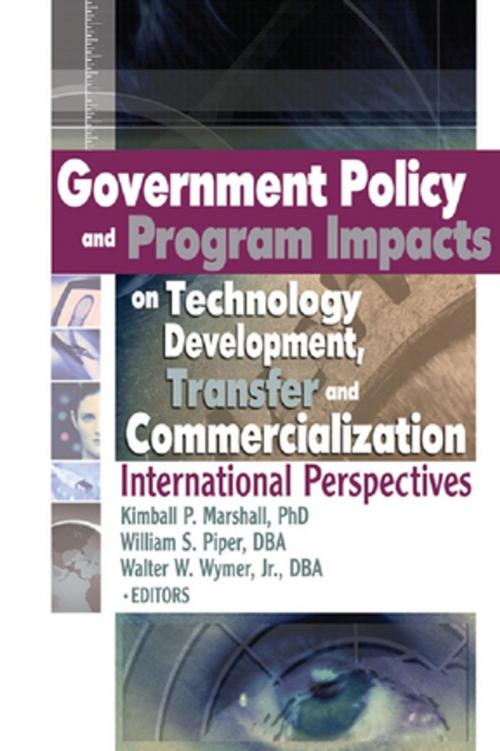Government Policy and Program Impacts on Technology Development, Transfer, and Commercialization
International Perspectives
Business & Finance, Industries & Professions, Information Management, Economics, International, Finance & Investing, Finance| Author: | Kimball Marshall, William Piper | ISBN: | 9781136429750 |
| Publisher: | Taylor and Francis | Publication: | February 1, 2013 |
| Imprint: | Routledge | Language: | English |
| Author: | Kimball Marshall, William Piper |
| ISBN: | 9781136429750 |
| Publisher: | Taylor and Francis |
| Publication: | February 1, 2013 |
| Imprint: | Routledge |
| Language: | English |
**In recent decades, government-funded technologies have produced radar, microwave ovens, modern cell phone systems, the Internet, new materials for aircraft and motor vehicles, and new medical instrumentation.
This first-of-its-kind book examines how access to technology is affected by government policies and government-sponsored programs.**
Government Policy and Program Impacts on Technology Development, Transfer, and Commercialization: International Perspectives provides an easy-to-read overview of the field and several studies serving as examples to guide government policymakers and private sector decision makers. This forward-looking book also forecasts the potential impacts of government regulation upon the field and presents provocative discussions of the ethical implications of the cross-cultural and cross-national challenges facing technologically developed nations in the global economy.
This book reviews this broad field by first providing an overview of the goals of government technology policies and programs as well as of generic types of government technology programs. Next, it presents carefully selected studies that illustrate the potential impacts of government decisions upon marketing constraints, industry acceptance of regulatory requirements, economic development, gross domestic product, and the choices firms make when it comes to location, competitiveness, product development, and other factors. The final chapters explore ethical considerations from a global perspective. These chapters also explore the implications of these considerations in relation to the success of governmental and private sector technology transfer and commercialization programs. The macromarketing perspective taken by the contributors serves to ground the impacts of government technology policies and programs in practical implications for economic development, business productivity, and quality of life.
The contributors to this unique collection share their expertise on government sponsorship of technology research, the impact of government regulation upon technology marketing and economic development, the effects of government policies on business practices, intellectual property rights, and much more.
Government Policy and Program Impacts on Technology Development, Transfer, and Commercialization shows how evolving technology and government policy changes have affected:
-
the commercialization of music-new media, piracy problems, consumer choices and costs, and changes in the radio and concert promotion industries
-
the adoption of new household technology
-
licensure requirements for telemedicine-with an essential overview of telemedicine plus examinations of relevant governmental regulations and potential applications
-
patents, copyrights, trademarks, licensing, and proprietary information
-
scrap tire disposal-new alternatives for a chronic waste disposal problem
-
food product development
-
state-owned enterprises-with a case study illustrating how a stagnant state-owned company quickly evolved into China’s leading firm in the textile machinery field
**In recent decades, government-funded technologies have produced radar, microwave ovens, modern cell phone systems, the Internet, new materials for aircraft and motor vehicles, and new medical instrumentation.
This first-of-its-kind book examines how access to technology is affected by government policies and government-sponsored programs.**
Government Policy and Program Impacts on Technology Development, Transfer, and Commercialization: International Perspectives provides an easy-to-read overview of the field and several studies serving as examples to guide government policymakers and private sector decision makers. This forward-looking book also forecasts the potential impacts of government regulation upon the field and presents provocative discussions of the ethical implications of the cross-cultural and cross-national challenges facing technologically developed nations in the global economy.
This book reviews this broad field by first providing an overview of the goals of government technology policies and programs as well as of generic types of government technology programs. Next, it presents carefully selected studies that illustrate the potential impacts of government decisions upon marketing constraints, industry acceptance of regulatory requirements, economic development, gross domestic product, and the choices firms make when it comes to location, competitiveness, product development, and other factors. The final chapters explore ethical considerations from a global perspective. These chapters also explore the implications of these considerations in relation to the success of governmental and private sector technology transfer and commercialization programs. The macromarketing perspective taken by the contributors serves to ground the impacts of government technology policies and programs in practical implications for economic development, business productivity, and quality of life.
The contributors to this unique collection share their expertise on government sponsorship of technology research, the impact of government regulation upon technology marketing and economic development, the effects of government policies on business practices, intellectual property rights, and much more.
Government Policy and Program Impacts on Technology Development, Transfer, and Commercialization shows how evolving technology and government policy changes have affected:
-
the commercialization of music-new media, piracy problems, consumer choices and costs, and changes in the radio and concert promotion industries
-
the adoption of new household technology
-
licensure requirements for telemedicine-with an essential overview of telemedicine plus examinations of relevant governmental regulations and potential applications
-
patents, copyrights, trademarks, licensing, and proprietary information
-
scrap tire disposal-new alternatives for a chronic waste disposal problem
-
food product development
-
state-owned enterprises-with a case study illustrating how a stagnant state-owned company quickly evolved into China’s leading firm in the textile machinery field















